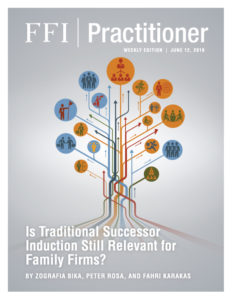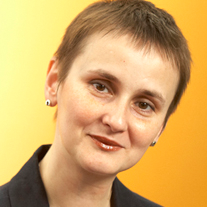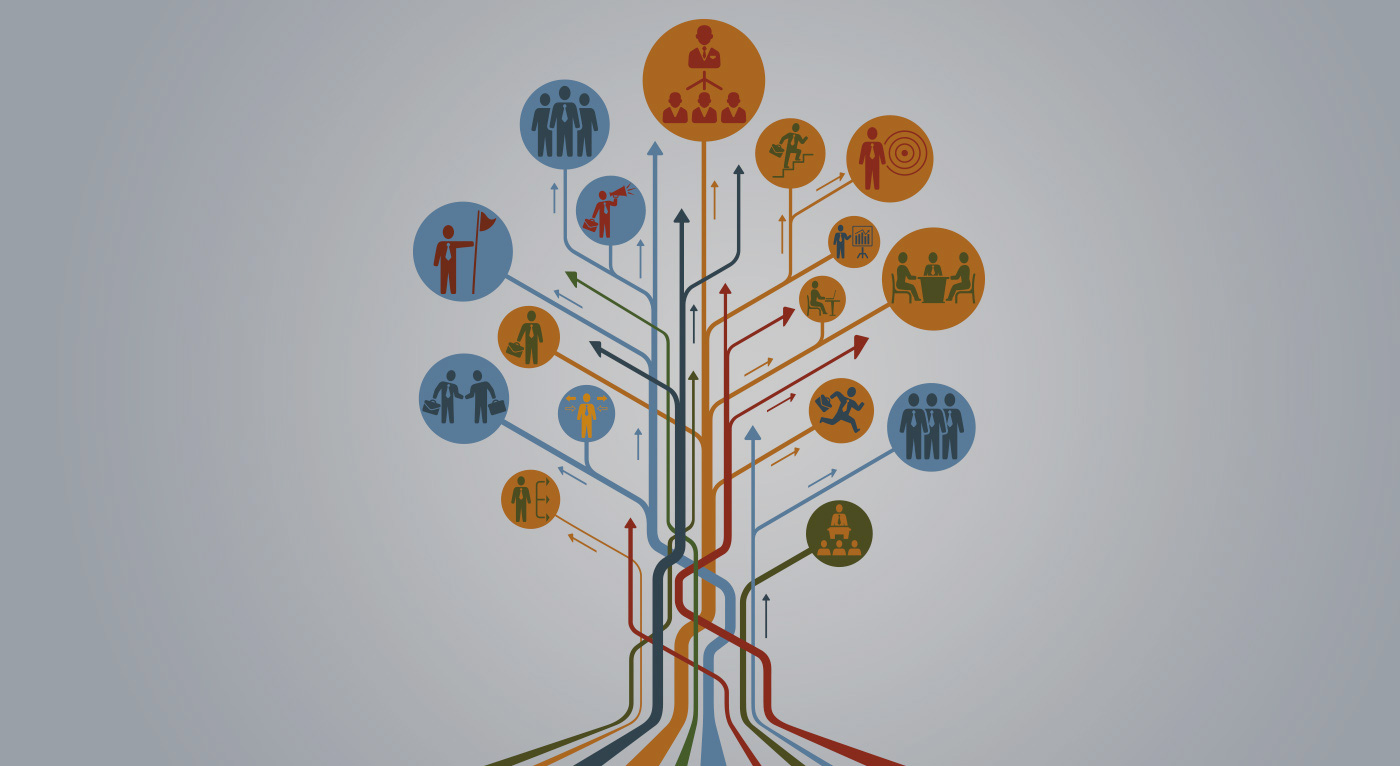
View this edition in our enhanced digital edition format with supporting visual insight and information.
Is the traditional method of family business leadership succession, where the successor joins the business at a young age and gradually learns the values and business knowledge from the senior generation, still the best approach? In this week’s FFI Practitioner, contributors Zografia Bika, Peter Rosa, and Fahri Karakas examine this question through a study of a multi-generational Scottish construction company and share actionable insights for advisors helping clients with succession planning.
When Donald McKay first joined McKay and Mills Construction Ltd., in the 1930s, he started at the bottom. As his son put it, “not quite digging the holes on a building site, but working as the lowest level of manager.” As Donald better understood how the firm functioned, he was involved in increasing levels of decision-making, until he eventually succeeded his father, Anthony, as the head of the family business. This on-the-job, “learning the ropes” educational process is typical of how most family firms traditionally prepare their successors to take over the business: through a gradual transfer of knowledge, values, and responsibility from one generation to the next, often from a young age.
Traditionally, most family firms believe that their success over the long-term depends on how well their family’s unique entrepreneurial values and proven business practices are passed on to the next generation. Fully equipped through a long period of induction, successors are expected to be able to continue sustaining and growing the family business for the benefit of family shareholders and employees. There is an assumption, however, that the social and business conditions that supported the success of the firm they have inherited will remain favorable, and that the successors’ managerial skills will continue to be effective and relevant. With rapidly changing social and economic conditions, would the lessons learned through years of apprenticeship continue to be useful in the face of new circumstances? Or could they even become counterproductive, requiring some element of “unlearning” or “re-socialization?” In today’s fast-moving business environment, is traditional successor induction still the best approach?
Our study of a multi-generational Scottish family firm shows that learning from older family members (underpinned by the traditional values of obedience, loyalty, and harmony) is no longer sufficient to adequately prepare the next generation of successors to run their family businesses well, particularly in the face of rapid social and economic change. In fact, the attitudes and skills of the older generation, conscientiously passed on to their children, may even contribute towards business failure.
Our research findings1, published in Family Business Review (2019), show that younger family members need to interact and learn from their peers as well as from external stakeholders including non-family corporate professionals, industry networks, mentors, and minority shareholders. We call this “interactive socialization,” which can also occur when family business successors work with external companies prior to joining the family firm. Such exposure allows them to develop new skills and experiences that can be applied to the family business later, in an experiential form of socialization. It is through such peer interaction and experiential learning that successful family businesses nurture an entrepreneurial mindset in their successors.
In our study of McKay and Mills Construction Ltd. (M & M), we found that while Donald McKay succeeded his father, Anthony, after a long apprenticeship at the company, it did not equip him to cope with the challenges brought on by the 1970s and 1980s recessions. Donald had to recruit externally for the financial skills necessary to restructure the company and this non-family board member was largely responsible for M & M surviving the 1970s—one of the few pre-war construction firms in Scotland to do so.
By the time the third generation – Donald’s son Bill and nephew David – took over the reins of the company upon Donald’s death in 1993, their socialization into the family business had become more collaborative. This was in part due to the younger generation’s interactive learning from non-family members in M & M’s management, including Jack, the financial director who ran the business under Donald and who was recruited as an external manager to mastermind change and business restructuring.
Bill and David also brought with them the skills and experience they had developed while working in architecture firms. Their interactions with peers, mentors, educational and industry networks, and other social and professional groups enabled them to implement innovation that set the company apart from other Scottish speculative builders.
To cope with changes and to survive over the long term, we also found that family firms need to engage in re-socialization, a process of re-orientating their values and strategies towards new models of best practice within their industry. For instance, when Alan, Rob, and Mary, the fourth generation of McKays, became involved in the company after 2000, they found themselves having to respond quickly and innovatively to the changing social and economic conditions affecting their family and business. Working with the company’s non-family board members, they used re-socialization as a conscious strategy and completely reversed the family culture and practices that early generation leaders had put in place. This included compromising on the firm’s longstanding commitment to producing traditional-style housing, diversifying into new businesses such as new timber kit company, and renting properties, as well as experimenting with new building methods and materials. Interestingly, none of the fourth-generation children had been traditionally inducted into the business and had no roles in the company until they were adults.
Family business succession is linked with the successors’ ability to influence external conditions as well as with the personal experiences they have accumulated over their lifetimes. But one size does not fit all. While different forms of socialization co-exist in long-lived family businesses, how they come to interact depends on the external conditions in which the family business operates. The faster the family business needs to respond to challenges in the external environment, the more dominant the interactive and experiential forms of socialization will be, and the more necessary the re-socialization of traditional practices and values.
Here are three actionable insights that practitioners can take from our research into family business succession planning:
Involve external parties in training successors
The training of family business successors should involve non-family members such as peers, mentors, minority shareholders, professional advisers, experts, and non-family managers who may not be driven by shared objectives or constitute a successor team. Such training should be open to questioning or transforming assumptions, identities, and values within the family business rather than just focusing on task learning and internalizing existing knowledge, roles, and expectations. This training informs decisions on how to reshape family business values and ensures succession in a less stable world.
Involve all in preparing for the unexpected
As Bika and Kalantaridis2 discuss in their study of organizational-social-capital, time and international family SMEs in the East of England, change and learning occur erratically. So we would argue that family businesses should equip all their members for the unexpected. Formal re-socialization training and mentorship would benefit the older generation of family business leaders as well as long-serving company employees, particularly those who are used to a tradition of stewardship and continuity and may therefore be reluctant to recognize and embrace change, according to Salvato, Chirico, and Sharma3. In our case study, re-socialization was used as a proactive strategy to realign the attitudes and practices of more conservative family shareholders and employees. It introduced changes that replaced traditional family management practices, including a fast-moving board of family and non-family directors, a less self-sufficient growth strategy, a proactive approach to the creation of entrepreneurial opportunities (such as a new induction and other tailored programmes for apprentices), and the adoption of new ‘modern’ managerial practices.
Take a more open and collaborative approach
Modern family businesses have open spaces and hold collaborative events that bring together diverse stakeholders and recognize a range of personal experiences, shifting roles, and emergent strategies in a flexible and changing context. For instance, the fourth generation of McKays introduced an open-plan office, which led to spontaneous meetings, replacing departments working with very little interaction with each other. The company also involved shareholders more in the running of the company through biannual shareholder-liaison-group meetings. Most importantly, the family business itself should not be viewed as an entity that needs to be “protected” from the outside and thus the socialization processes used for the exclusion of “outsiders.”
About the Research (SIDEBAR)
To help us understand how socialization operates in business succession of long-lived family firms, we conducted in-depth interviews with six directors and managers of the McKay and Mills Construction Company, of which two were non-family members. Including non-family members provided us with new information and perspectives that family members were less aware of, tended to gloss over, or ignored. We also used secondary data sources to construct the owner-family profile, map out entrepreneurial moves, describe important contingencies, understand the family business governance structure, and document relevant outcomes (e.g., profits). We analyzed the data through a line-by-line analysis, taking pairs of expressions, searching for similarities and differences, and cutting and sorting. A single-case approach enabled us to explore in considerable detail how socialization patterns and outcomes evolved from one generation to another. Narrative inquiry was used to detect how traditional forms of socialization became increasingly less relevant as external conditions grew more volatile in the third and fourth generations and were replaced by more dynamic and interactive processes.
References
1Bika, Zografia, Peter Rosa, and Fahri Karakas. “Multilayered Socialization Processes in Transgenerational Family Firms.” Family Business Review, (February 2019). doi:10.1177/0894486519827435.
2Bika, Zografia, and Christos Kalantaridis. “Organizational‐Social‐Capital, Time and International Family SMEs: An Empirical Study from the East of England.” European Management Review, (15 December 2017). doi: https://doi.org/10.1111/emre.12160.
3Salvato, Carlo, Francesco Chirico, and Pramodita Sharma. “A farewell to the business: Championing exit and continuity in entrepreneurial family firms,” Entrepreneurship & Regional Development, 22:3-4 (2010): 321-348, doi: 10.1080/08985621003726192.
About the Contributors

Zografia Bika is an associate professor in entrepreneurship at the University of East Anglia, Norwich Business School, U.K. Her research focuses on rural, family, and institutional entrepreneurship issues using a sociological lens and has been published in journals such as Family Business Review, Regional Studies, Entrepreneurship and Regional Development, Sociological Review, European Management Review, and Environment and Planning A. Her family business research was previously funded by the U.K. Economic and Social Research Council and won the Best “Family Business” Paper Award at the 2018 Academy of Management Conference, Entrepreneurship Division, Chicago, USA. She can be reached at z.bika@uea.ac.uk.

Peter Rosa holds the George David Emeritus Chair of Entrepreneurship and Family Business at the University of Edinburgh Business School, U.K. He has been researching entrepreneurship since the 1980s and has a specialist interest in portfolio entrepreneurship and transgenerational entrepreneurship in business families.

Fahri Karakas is an associate professor in business and leadership at the University of East Anglia, Norwich Business School, U.K. He has published in international management journals such as Journal of Business Ethics, International Journal of Human Resource Management, Journal of Management Education, and Journal of Management Development.
About the University of East Anglia’s Norwich Business School
The University of East Anglia’s Norwich Business School was ranked in the top 5 for overall student satisfaction in Finance, Management, Business Studies and Marketing (UK – National Student Survey); World top 150 for Business and Economics (Times Higher Education World Rankings 2018); 13th for Accounting and Finance, 15th for Business, Management and Marketing (UK – Guardian Guide 2019) and 8th for Marketing (UK – Complete University Guide 2019). The latest HEFCE assessment of research excellence (REF 2014) puts Norwich Business School 17th overall in the UK out of 101 institutions and in 9th place for the quality of its research publications (Times Higher Education).

View this edition in our enhanced digital edition format with supporting visual insight and information.





